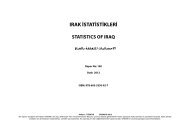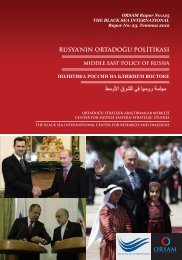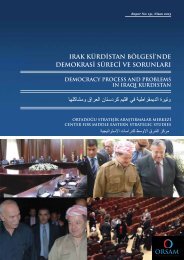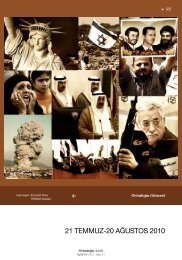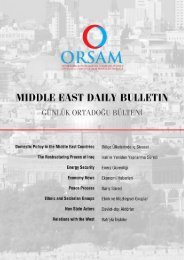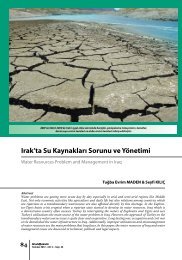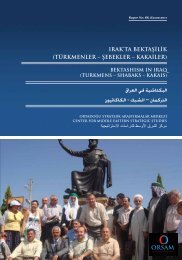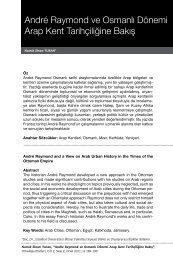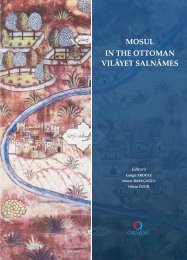Full text - orsam
Full text - orsam
Full text - orsam
You also want an ePaper? Increase the reach of your titles
YUMPU automatically turns print PDFs into web optimized ePapers that Google loves.
ORSAM<br />
CENTER FOR MIDDLE EASTERN STRATEGIC STUDIES<br />
You all know this fact. We don’t need to hide<br />
it”. In the same speech, it was stated that “the<br />
budget coming from Baghdad was shared<br />
between Sulaymaniya and Germiyan administration<br />
(43 per cent) and Arbil and Duhok<br />
administration (57 per cent) until 21 December<br />
2010. 50<br />
Based on all these, we can suggest that the<br />
disagreement on sharing the administration<br />
and the problems stemming from the sharing<br />
system between parties paralyzed institutionalization<br />
of the political system in the<br />
region. Also, Kurdish parties led to a civil<br />
war especially between KDP and PUK. This<br />
situation led to a split among Kurdish political<br />
parties, especially between KDP and PUK<br />
in the con<strong>text</strong> of government, administration<br />
and jurisdiction. Also, the end of conflicts<br />
between the aforesaid political parties paved<br />
the way for the reunification of government<br />
at high level. However, party interests prevented<br />
the unification of two administrations<br />
in the region. Despite the fact that elections<br />
were held in the region for two periods and<br />
also three-period elections were held at federal<br />
level after the end of civil war between<br />
the aforesaid parties, both political parties do<br />
their best to maintain the current situation.<br />
Nevertheless, negative consequences of this<br />
equation in the con<strong>text</strong> of sharing the administration<br />
between the parties, as well as the<br />
widespread corruption and problems in democratic<br />
process led to a civilian tendency<br />
at public level to make a reform to improve<br />
the political system in the region in terms of<br />
its structure. It also made it possible for the<br />
Change (Gorran) Movement to appear in the<br />
region as a political opposition. 51<br />
2. CHALLENGES OF THE DEMOCRATIC<br />
PROCESS IN IRAQI KURDISTAN<br />
Democratic regimes have proved their success<br />
in the face of internal and foreign crises<br />
and risks throughout centuries. For instance,<br />
democratic regimes won the World War<br />
I and II in the West, and also during the Cold<br />
War, they achieved success against totalitarian-authoritarian<br />
regimes such as Monarchies,<br />
Nazism, Fascism and Communism. At the<br />
same time, those democratic regimes achieved<br />
dealing with internal political and economic<br />
challenges, solving crises. Thus, it made it<br />
possible to turn the developments that led to<br />
collapse of other regimes into an advantage.<br />
The collapse of Communist regimes in Eastern<br />
Europe and the split of the Soviet Union<br />
has been a big lesson in this terms.<br />
Mechanisms and primary elements of democratic<br />
regime such as freedom of expression,<br />
political pluralism, peaceful government<br />
change give opportunity to quickly see deficiencies<br />
and mistakes, as well as coming up<br />
with political programmes and successful<br />
solution of political and civilian parties, and<br />
also alternative programmes to the suggestions<br />
of other parties. So that, this process leads<br />
to elimination of deficiencies and mistakes,<br />
to development and renovation almost in<br />
each election period. Also, these mechanisms<br />
bring along political stability in the long term<br />
as they create an environment to solve and<br />
manage internal political conflicts through<br />
peaceful methods, and they give equal opportunities<br />
to those conflicting with one another<br />
to come into power by gaining public consent<br />
and pleasure.<br />
Establishing a real democratic regime in the<br />
region enables establishing political stability,<br />
and improving economic and social development.<br />
Besides, it also helps reinforcing political<br />
power in a way to use current international<br />
and regional opportunities in the future<br />
to reach the goals and to get rid of potential<br />
threats. But the democratic process encounters<br />
major challenges in the region. And this<br />
situation weakens its relations with the outside<br />
and also leads to internal instabilities.<br />
14<br />
ORSAM<br />
Report No: 151, April 2013




